“Sexton I still read, but Plath I gave up on. For some years I was very enthusiastic about her, but I don’t feel the attraction any more. With poetry, I go where I’m pulled.”
Jon Hassler, Simon’s Night
Terry Teachout on the arts in New York City
“Sexton I still read, but Plath I gave up on. For some years I was very enthusiastic about her, but I don’t feel the attraction any more. With poetry, I go where I’m pulled.”
Jon Hassler, Simon’s Night
Various forms of the records-that-changed-my-life meme have been making the rounds lately, so I came up with my own version, which I call “The Twenty-Five Record Albums That Changed My Life.” Throughout the coming month, I’ll write about one of these albums every weekday in the order in which I first heard them:
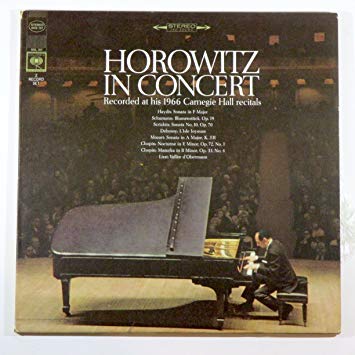
In time I saved my pennies and bought my own copy of Horowitz in Concert, the library’s copy having acquired so many ticks, pops, and scratches, more than a few of them put there by me, that I felt it was the least I could do. Today I own dozens of Horowitz CDs, but Horowitz in Concert has a special place in my heart, above all for the explosive performance of Debussy’s “L’isle joyeuse” that was and is my favorite track. No one has ever played this astonishing piece more thrillingly than Horowitz did at Carnegie Hall half a century ago.
(To be continued)
* * *
Vladimir Horowitz plays “L’isle joyeuse” at Carnegie Hall in 1966:
* * *
To read about album #1, go here.
W.B. Yeats reads “The Lake Isle of Innisfree.” This reading was originally recorded by the BBC on October 28, 1936:
(This is the latest in a series of arts- and history-related videos that appear in this space each Monday, Wednesday, and Friday)
There’s not a woman turns her face
Upon a broken tree,
And yet the beauties that I loved
Are in my memory;
I spit into the face of Time
That has transfigured me.
William Butler Yeats, “The Lamentation of the Old Pensioner”
Various forms of the records-that-changed-my-life meme have been making the rounds lately, so I came up with my own version, which I call “The Twenty-Five Record Albums That Changed My Life.” Throughout the coming month, I’ll write about one of these albums every weekday in the order in which I first heard them, starting in 1968:
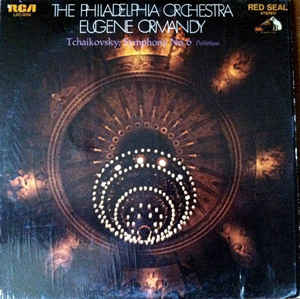
This is the first record album I bought with my own money. It came out in 1968, the year I started going to junior high school. I know why I chose this particular version: Eugene Ormandy and the Philadelphia Orchestra had just signed a recording contract with RCA, and his remake of the “Pathétique” was on sale at the only music store in Smalltown, U.S.A., that carried classical records. I don’t know why I opted for Tchaikovsky over, say, Beethoven or Mozart, but I probably heard the piece on TV at some time or other and was swept away by its heart-on-sleeve romanticism, which was made to thrill sensitive, susceptible twelve-year-old eggheads like me.
Within a few years, alas, I’d turned my nose up at Tchaikovsky (I was quite the little music snob in college). Fortunately, I soon came to my senses and realized the truth of this remark by Benjamin Britten: “I’ve always inclined to the clear and clean—the ‘slender’ sound of, say, Mozart or Verdi or Mahler—or even Tchaikovsky, if he is played in a restrained, though vital, way.” Britten said this in 1944, at a time when the notion of performing a piece like the “Pathétique” in a “restrained, though vital, way” was alien to most musicians, Ormandy included. Not until much later did tastes in Tchaikovsky interpretation start to shift. Once I’d heard the “Pathétique” played by Arturo Toscanini, I knew there were other, better ways to perform his music. Nevertheless, it was Eugene Ormandy who first got me through the door, for which I will forever be in his debt.(To be continued)
From 2009:
Read the whole thing here.Much has been written in recent days, most of it silly and some of it ignorant, about the modern art that Barack and Michelle Obama have borrowed to display in the White House….
“In hatred as in love, we grow like the thing we brood upon. What we loathe, we graft into our very soul.”
Mary Renault, The Mask of Apollo
• The book I am currently reading. John Stangeland’s Warren William: Magnificent Scoundrel of Pre-Code Hollywood.
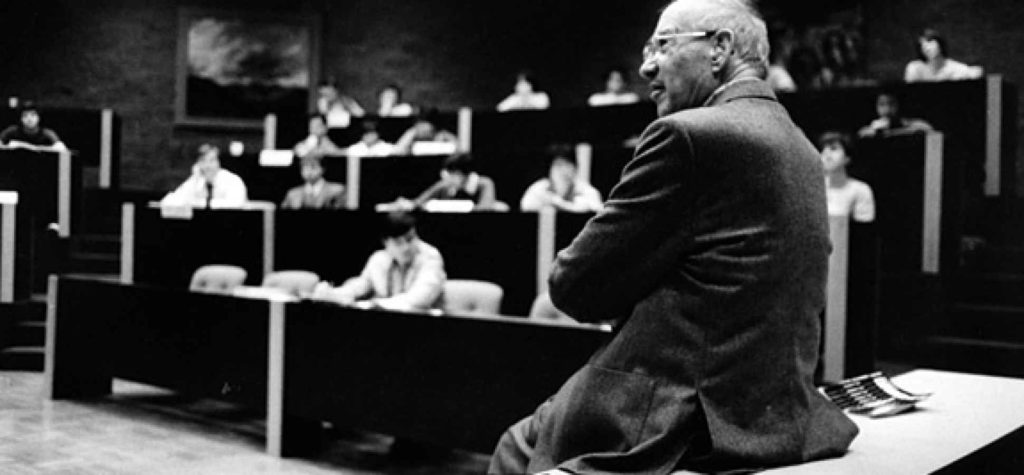
• The book that changed my life. Peter Drucker’s Adventures of a Bystander. No book in any genre has done more to shape the way in which I look at and think about the world. In addition, I have also read Irving Babbitt’s Democracy and Leadership repeatedly and thought about it deeply.
More specifically, I’ve never learned more from a single published sentence than I did about Jews, Jewish culture, and the Jewish sense of humor (if you want to call it that) from the opening line of Isaac Bashevis Singer’s Enemies, a Love Story: “Although I did not have the privilege of going through the Hitler holocaust, I have lived for years in New York with refugees from this ordeal.”
• The book I wish I’d written. James Gould Cozzens’ Guard of Honor. I have no gift for the writing of fiction, but if I did, that’s the kind of novel I’d like to write.
• The book that had the greatest influence on my writing. Reading Edmund Wilson’s Classics and Commercials taught me how to be a critic. Reading Fairfield Porter’s Art in Its Own Terms and The Film Criticism of Otis Ferguson taught me how to be a better one.
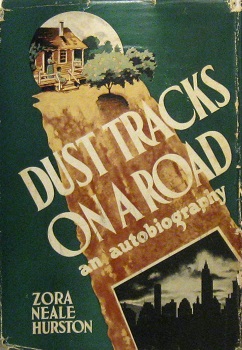
• The book I think is most under/overrated. I think Peter DeVries’ The Blood of the Lamb is one of the half-dozen greatest American novels of the twentieth century. I’m also a fervent admirer of Zora Neale Hurston’s Dust Tracks on a Road: An Autobiography, though it’s more widely read today than it used to be, meaning that it probably no longer qualifies for “underrated” status.
As for overrated…well, I wouldn’t even know where to start. Most books are overrated, don’t you think?
• The book that changed my mind. David R. Dow’s Autobiography of an Execution. Prior to reading it, I was a supporter of the death penalty. Afterward, I wasn’t.
• The last book that made me cry. Jon Hassler’s North of Hope, a funny, touching novel about a Roman Catholic priest suffering from depression who meets up in the middle of life with a woman on whom he had a hopeless crush when they were both in high school. (No, they don’t.)
• The last book that made me laugh. I scarcely ever laugh out loud when reading. Five books that did make me do so, however, are Kingsley Amis’ Lucky Jim, Anthony Bourdain’s Kitchen Confidential, P.J. O’Rourke’s Give War a Chance, Dawn Powell’s The Locusts Have No King, and Honor Tracy’s The Straight and Narrow Path.
• The book I couldn’t finish. Bleak House. I did my damnedest, but to no avail. I’ll take Trollope over Dickens any day.
• The book I’m most ashamed not to have read. I don’t do that kind of shame. That said, I wish I spent more time reading poetry. The only poets to whose work I now return with anything like regularity are Hardy, Yeats, Auden, and Larkin.
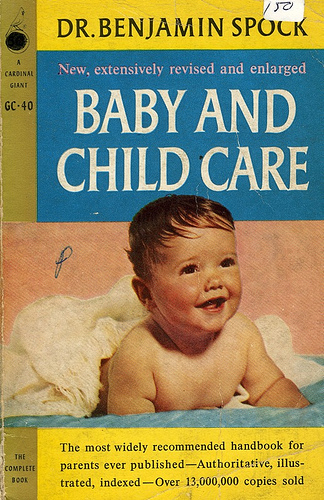
• My earliest reading memory. I taught myself to read at the age of three, and so cannot remember a time when I wasn’t reading for pleasure, or found any pleasure in children’s books. (Laura Ingalls Wilder’s novels of pioneer life were read out loud to me in elementary school.) Believe it or not, though, the very first book I can clearly remember reading and enjoying was my mother’s well-thumbed paperback copy of Benjamin Spock’s Baby and Child Care. I was fascinated by the chapters on childhood diseases.
• My comfort read. I often turn to Patrick O’Brian’s Aubrey-Maturin novels, Rumer Godden’s In This House of Brede, Anthony Powell’s A Dance to the Music of Time, and the novels of William Haggard, Elmore Leonard, John P. Marquand, Edwin O’Connor, and Rex Stout in times of stress. (I also like to relax with biographies of classical musicians, God knows why.)
• The book I give as a gift. The Library of America’s one-volume edition of Flannery O’Connor’s Collected Works, which I like to give to young friends who’ve never read O’Connor. (She is one of the writers who means most to me.) In addition, I’ve also given out quite a few copies of two of my own books, Pops: A Life of Louis Armstrong and All in the Dances: A Brief Life of George Balanchine.
• The book I’d most like to be remembered for. Pops, I guess, though I’m also very proud of A Terry Teachout Reader.
| M | T | W | T | F | S | S |
|---|---|---|---|---|---|---|
| 1 | 2 | 3 | 4 | 5 | ||
| 6 | 7 | 8 | 9 | 10 | 11 | 12 |
| 13 | 14 | 15 | 16 | 17 | 18 | 19 |
| 20 | 21 | 22 | 23 | 24 | 25 | 26 |
| 27 | 28 | 29 | 30 | 31 | ||
An ArtsJournal Blog